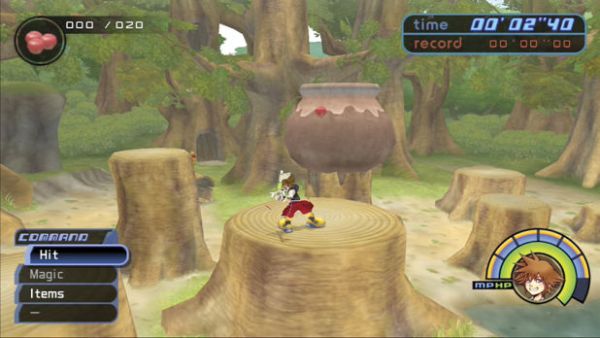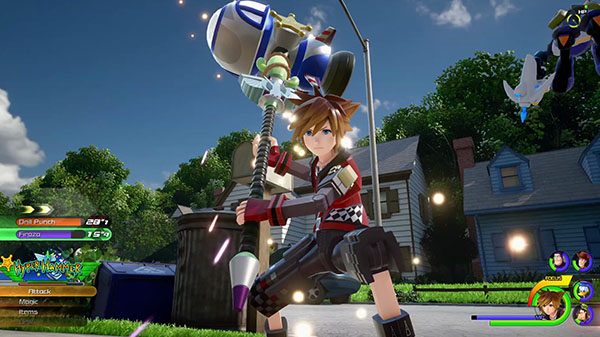14 years. We’ve had almost a 14-year gap between the release of Kingdom Hearts II and Kingdom Hearts III. In that time we’ve gotten a handful of spinoff titles adding in new characters, events, gameplay elements and more. The series has then adapted these elements into future games, creating a kind of amalgamation of different elements.
This has always been true of the series, however, as even the first Kingdom Hearts puts a big emphasis on gameplay variation. It’s been the crux of what makes the series so enjoyable, and it looks like Kingdom Hearts III gets that, adding in more variety than ever before.
One thing that you can always be sure of in a Kingdom Hearts game, is that each and every world will have some kind of unique gimmick or gameplay element. This is highlighted best by the fact that you get a new party member in almost every single world. Whether it’s Jack Skellington or Aladdin, each of these characters function integrally differently.
The first Kingdom Hearts also took liberal steps to mix up the pacing and gameplay style throughout the experience. The gummi ship adds in rail shooter sections, while the Hundred Acre Wood world slows things down for a fun side story, filled with minigames. Meanwhile, the Peter Pan world introduces the ability to glide and fly while Atlantica lets you swim, changing the way you control Sora both in movement and combat.

Furthermore, many of the worlds have unique gimmicks to them. Nowhere is this better exemplified than with Kingdom Hearts II. The Pirates of the Caribbean world makes enemies vulnerable only when they’re in the moonlight. The Lion King world changes the way combat and movement work by making you a lion. Atlantica is a series of musical rhythm games. Timeless River paints everything in a Steamboat Willie style and adds in unique minigames for each area of the world.
Birth By Sleep even added a Lilo & Stitch world that plays around with anti-gravity. Each world was varied from the beginning of the series, and it’s only become truer as time went on.
Straight out of the gate after the first game, the series was already really shaking things up with Kingdom Hearts: Chain of Memories, introducing a card-based combat system very different from the original. Later spinoffs would once again bring big changes to core gameplay. Birth By Sleep added Command Styles into the mix, and Dream Drop Distance added Flowmotion and Dream Eater monster-training.
Each and every Kingdom Hearts game tries to add new gameplay elements in, and now we’re finally near the release of Kingdom Hearts III. We’ve seen quite a bit of gameplay footage and trailers so far, and it’s abundantly clear that Kingdom Hearts III wants to be the most diverse game in the series yet. It combines elements from across the series while looking to make each and every world more unique than ever before.
At E3 earlier this year, we got some hands-on time with Kingdom Hearts III, and it definitely feels strikingly familiar off the bat. The Command Styles of BBS have been adapted into Keyblade Transformations, letting you change Sora’s Keyblade into crazy new weapons on the fly, like a giant hammer with the Toy Story Keyblade or a rocket-powered ship with the Big Hero 6 one. Flowmotion has also been advanced, letting Sora run up walls and objects or interact with the environment.

Even past this, you have a variety of different summons to choose from, each of which play completely different. Wreck-It Ralph lets you construct blocks that shoot projectiles out at enemies, while Ariel lets you dive into the ground and shoot jets of water up at enemies. You’ll also be able to hop into theme park attractions like the Teacups, spinning around the battlefield and slamming into enemies.
There are so many options for combat in Kingdom Hearts III that it can be almost overwhelming. However, this means that you can approach every encounter however you want, and two players might have completely different combat styles.
Kingdom Hearts III is also doubling down on making every single world have a unique gimmick, even multiple gimmicks. The Toy Story world lets you hop into toy mechs and blast enemies from a first-person perspective. Tangled has sections requiring to use Rapunzel’s hair like a grappling hook. Pirates of the Caribbean has Assassin’s Creed-esque ship battles. Frozen has you using Goofy’s shield like a sled to go down mountains. Big Hero 6 has you flying through the air on Baymax in rail-shooter style.
The amount of variation we’ve seen is staggering, especially considering we’ve only seen a few hours of footage between everything.
At the same time there seem to be quite a few new minigames in Kingdom Hearts III, like cooking with Remy from Ratatouille, the nostalgia-infused Classic Kingdom games, or some kind of selfie minigame in the latest trailer. The gummi ship also makes a return for the first time since Kingdom Hearts II. All of this seems to indicate a game that wants to be something different in the moment-to-moment gameplay. It’s an experience constantly keeping players engaged with new systems.
Many JRPGs double-down on their core systems, whether it be combat or exploration. There’s a focus on depth for a specific system, versus a wide array of systems. Kingdom Hearts has never wanted to be this. It makes sense, really, as Kingdom Hearts is literally an amalgamation of different Disney and Square Enix properties.
The only way to make this crazy idea work is to provide wildly different experiences between these different Disney properties. Exploring Tarzan’s world and exploring Halloweentown should be very different, because the source material they come from are total opposites.
With every Kingdom Hearts game, it’s exciting to see how things are done differently; what new gimmicks you might see in the new Disney properties. This has always been the biggest strength of the series, and it always will be. It’s baked into the very foundations of what makes Kingdom Hearts what it is.
